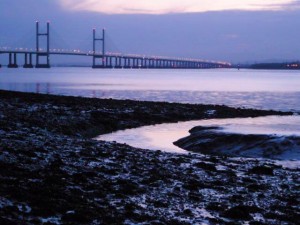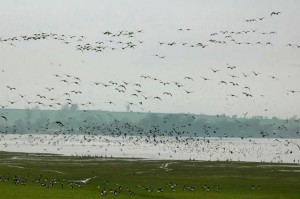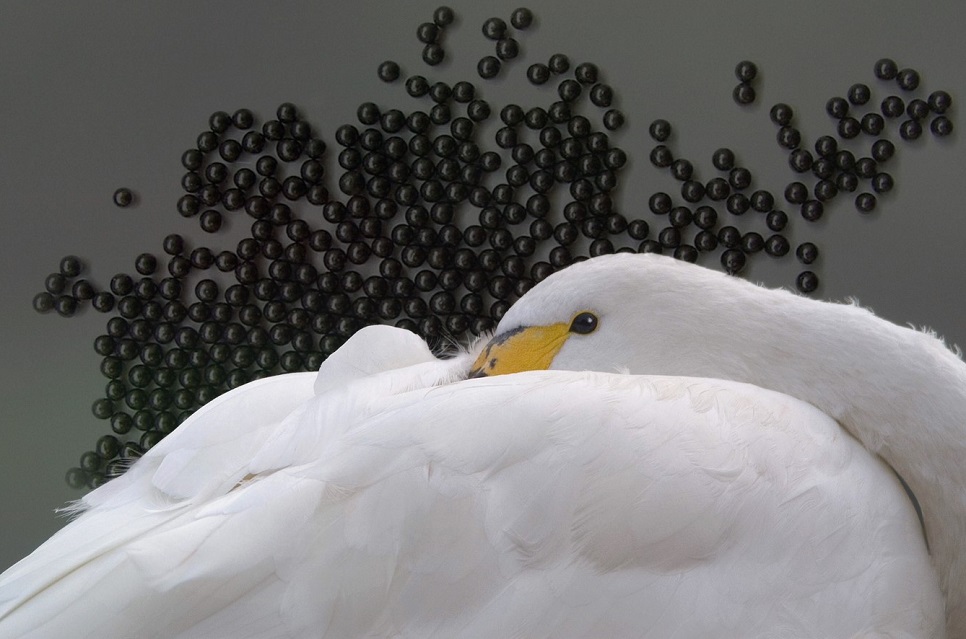NGOs meet with Peter Hain to raise concerns about Severn Barrage
 WWT and a group of environmental and angling Non-Governmental Organisations (NGOs) met today with Peter Hain MP to raise their concerns about the impact of a tidal power barrage which he is championing for the Severn Estuary.
WWT and a group of environmental and angling Non-Governmental Organisations (NGOs) met today with Peter Hain MP to raise their concerns about the impact of a tidal power barrage which he is championing for the Severn Estuary.
The Severn Estuary is one of the largest estuaries in Europe and is of international importance for its wildlife and is a unique landscape.
Its saltmarshes and mudflats are used by 69,000 birds each winter, its waters support over 100 fish species and vast numbers of invertebrates, and the estuary is a vital migration route for fish including salmon and eels.
In 2010 a Government study into the feasibility of building a barrage across the Severn confirmed that the impacts of a conventional 'high head' barrage could be catastrophic, including the local extinction of some species of fish and an increase in flood risk over an area of 370 square kilometres containing 45,000 residential properties.
This highlights the fact that barrage construction in the Severn Estuary could have unacceptable impacts that would damage wildlife and disrupt the lives of those who and live and work around the estuary for decades if not centuries to come.
Supporters of a new proposal for a 'low head' barrage being championed by Mr Hain hope that their development would be less damaging. However, to date there is insufficient information to assess the extent to which this may actually be the case. NGOs have therefore been deeply concerned that the MP for Neath has been quoted in the media stating that the proposal will be benign or even beneficial to wildlife.
They set out a series of key challenges for Mr Hain and leaders of the consortium which is developing the plans, in order to address the very serious potential impacts of their proposals.
They stressed that it is imperative that they seek independent, peer-reviewed assessments of the nature and scale of the impacts; in particular on the many fish species that live in and pass through the estuary, and on the geomorphology of the estuary which will dictate how habitats, birds and flood risk would be affected by the proposal.
 All the NGOs recognise that there is an urgent need to tackle climate change and that renewable electricity generation is a vital part of the solution. However, inappropriately designed or located renewable energy developments can cause serious and irreparable harm to wildlife.
All the NGOs recognise that there is an urgent need to tackle climate change and that renewable electricity generation is a vital part of the solution. However, inappropriately designed or located renewable energy developments can cause serious and irreparable harm to wildlife.
For energy generation to be labelled 'green', it must not only be renewable, but also avoid unacceptable damage to wildlife and the ecosystems upon which it depends.
The NGOs will be submitting a document to Mr. Hain and the consortium setting out the key areas of concern and the work that needs to be done to assess the scale of the impact of the proposal.
Dr Deborah Pain (Conservation Director for the Wildfowl & Wetlands Trust) said "WWT supports the search for appropriate use of tidal energy in the Severn Estuary, but it is a delicately balanced environment where ill-thought through schemes could be damaging to wildlife, homes and businesses if we get it wrong.
"We are concerned that this proposal still isn't right, and have certainly not yet seen enough evidence to suggest otherwise. We urge the Government to stick to the findings of the Severn Tidal Power Feasibility Study, and Peter Hain to work with all the interested groups to produce the power we need while minimising damage to the environment we live in".
Kate Jennings from the RSPB said: "we welcome this opportunity to make our concerns clear to Mr Hain and to the consortium. We urge the consortium to provide us with an independent assessment of the impact of the proposed barrage on the environment and communities of the Severn Estuary and beyond, as an essential part of producing a robust and responsible proposal. Without that, it will not be possible to reach an informed view on what is proposed, and our concerns will remain unaddressed."
Mark Lloyd, chief executive of the Angling Trust said: "the proposed barrage could block safe access for salmon, shad and eels to rivers such as the Severn, Wye and Usk and it could cause major impacts on the countless marine fish that feed and breed in the estuary. Any significant increased mortality of these species would have a major impact on recreational angling and commercial fishing. We cannot consider whether to support any proposal in the Severn until robust and peer-reviewed science has been produced to quantify the impact on fish."
Alun James, Policy Officer from WWF Cymru said: "As a group, the NGOs have significant interests in the Severn Estuary – and a lot of expertise in understanding the effects of development on wildlife. We are keen to see a robust evidence-based assessment of the impact on the estuary and its wildlife of any proposal to harness Severn tidal power."
Paul Knight, CEO at the Salmon & Trout Association said "rather than threaten the collective marine and freshwater ecosystem by building a total barrier across the estuary, surely it is more environmentally responsible and makes better business sense to wait for new technology that can harness tidal energy without severely impacting the aquatic environment and all its dependent species".

